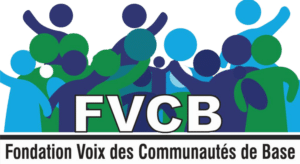Above you can see a global views of some our carried programs!
MUSO
HHI-FVCB implemented the MUSO strategy for the first time in Petit-Goâve in 2015 and deployed it in the South-East department in 2018 thanks to the support of Highland Park United Methodist Church, College Church Of The Nazarene and The United Methodist Church of the Resurrection. FVCB relied on local leaders to mobilize the communities.
MUSO is a form of microcredit resilience executed among a group of socially homogeneous people who know each other and who pool their resources to achieve common goals. Those people live in the same community and mutually guarantee the success of the model.
HHI-FVCB delivered training to MUSO members in order to teach them how to self-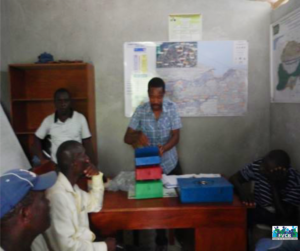 manage the group. Members have been encouraged to pool their money to grant themselves loans at a very low-interest rate.
manage the group. Members have been encouraged to pool their money to grant themselves loans at a very low-interest rate.
N.B. As part of some training, HHI-FVCB staff can emphasize topics such as hygiene and health or water and sanitation to raise awareness of the populations about those issues. They encourage them to acquire good hygiene habits and to build quality sanitary infrastructures with the profit generated through the MUSO group.
HHI-FVCB staff oversaw the smooth running of the activities to execute the MUSO which allowed for later creation of local economic opportunities and pushed communities towards greater resilience and social cohesion.
In the experience of HHI-FVCB, the MUSO groups become totally autonomous – to the point of creating their own banks – within approximately three years, demonstrating the sustainability and success of the model. Take for example the groups in Petit Goâve: they now have more $ 130,000 of their own money in circulation!
Kore Fanmi
HHI-FVCB – Haiti was one of the main partners of UNICEF for the multi-disciplinary and holistic program « Kore Fanmi », developed from 2013 to 2017. The program was community-based and aimed for providing direct social assistance to support the most vulnerable households. It combined education with an awareness campaign to connect beneficiaries with available services, create and maintain a social network.
A network of polyvalent community agents (AKF) was deployed in West and South East departments to follow the families throughout all social protection components and to create trusted relationships with them. All targeted families were paired with an agent who knew all the life and territory conditions of the families. More specifically, the program was meant to:
- Promote positive behaviors & transfer key knowledge for the well being of the households
- Provide families with essential products and direct social assistance
- Strengthen a database to facilitate access to social services for the families and build a bridge between other initiatives and community-based programs.
Thanks to our team support, 98 AKF were trained and deployed for the program, 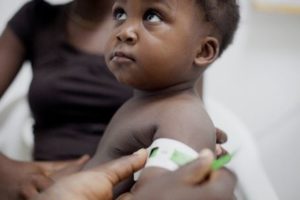 which was directly profitable to 12 463 families. In addition, 8 254 families were given referrals to social services (health center, register of births, marriages & deaths, etc.) and 2 023 children were vaccinated.
which was directly profitable to 12 463 families. In addition, 8 254 families were given referrals to social services (health center, register of births, marriages & deaths, etc.) and 2 023 children were vaccinated.
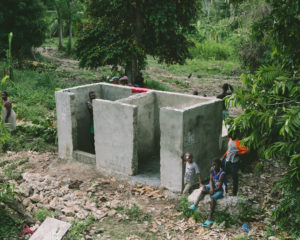 Finally, HHI-FVCB played a key role in implementing ACAT (Community Approach to Total Sanitation) throughout the project. At the end of the program, 1 259 new families had at their disposal latrine and 29 localities were certified FDAL (End of Open Defecation).
Finally, HHI-FVCB played a key role in implementing ACAT (Community Approach to Total Sanitation) throughout the project. At the end of the program, 1 259 new families had at their disposal latrine and 29 localities were certified FDAL (End of Open Defecation).
This represented a big success, not only for those communities but also for the whole country, which made the government encourage other organizations to come in Thiotte to learn from HHI-FVCB strategy and methodology to execute ACAT.
ACAT
Funded by UNICEF, Fondation Voix des Communautés de Base started the ASWA II program in Lascahobas September 2020-November 2021. Through the deployment of trained community agents, the program aimed to accompany 10,000 households to access basic hygiene and sanitation.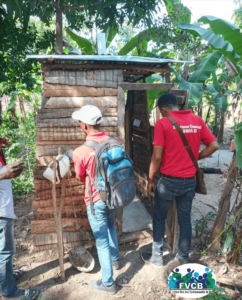
- We trained 684 community facilitators on the ACAT approach and implementation strategies.
- We conducted WASH education for 17,883 community members
- We have carried out training sessions for 550 teachers, parents and schoolchildren, including at least 30% women, on good hygiene practice at school.
- We carried out 9630 facilitation sessions for the 15 months with households.
- We have led communities to build 1031 latrines, rehabilitate 554 rehabilitated and complete 307 with handwashing stations
Federations of sectors
Several political systems, associations, professions, religions, etc. exist among a community. We call them « sectors ». Those different sectors often have mindsets far from each other. Thus, it may seem unbelievable to make them collaborate together to develop their own community; And yet this is what HHI-FVCB successfully managed to do.
Indeed, when starting working with a community, the first question our teams wonder is « What are the needs of the community and how, with our outsider way of thinking, can we help the local community to create projects which will fulfill its own needs? ». A simple concept in theory, which was too often eluded from the talks of many organizations in Haiti. By neglecting the local population’s involvement, most of them missed the opportunity to develop long-term and sustainable projects.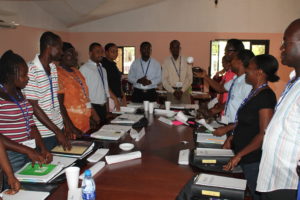
We wanted to give back the power to the communities in order they could act for themselves. We promoted a leadership development model which relies on already existing and organized groups among a community.
We call this specific process a « Federation of Sectors ». Local government, religious groups, local associations, organizations, and experts are gathered to take their responsibilities upon themselves, share their resources and guide their community towards an improvement of the living conditions.
Numerous supports helped HHI-FVCB to make this project possible, among which: Becton Dickinson (BD), Welch-Allyn, the American Academy of Family Physicians Foundation, MidAmerica Nazarene University, Inveneo, Nueterra, Lehigh University, etc. FVCB now relies on the 23 existing federations to implement several programs – which represents a key success factor.
Cholera
Cholera was introduced in Haiti shortly after the earthquake in 2010, blossomed into an epidemic and, since it’s introduction, has killed thousands and sickened hundreds of thousands more. Cholera is an acute, diarrhea illness caused by infection of the intestine but as bad as Cholera is, it is preventable.
And that is where our WASH program starts – Prevention. WASH (Water, Sanitation & Hygiene) is vital for any community. It’s the beginning point of any discussion about making a real change in the health of a community.
Without addressing these needs first, the cycle of disease will continue. Thanks to the support of Becton Dickinson (BD), the United Methodist Church of the Resurrection and Johnson & Johnson, HHI-FVCB ran a WASH program from 2010 to 2015 in Petit Goâve and in the South East department. HHI-FVCB trained community health agents to tackle down the epidemic in the hinterland of Haiti. Those agents taught the population about good hygiene habits and about 100 000 people were raised awareness. We also distributed around 1 200 cholera kits for a child, adult or family to keep Cholera from spreading in their home and villages.
Learn more about this program in this video
Mathew hurricane
In October 2016, just days following Hurricane Matthew, 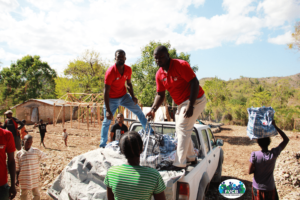 HHI-FVCB was holding emergency response clinics in Jeremie (at the epicenter of the class 4 hurricane) in Grande Anse department, thanks to the support of USAID and WHO. Knowing our experience with Cholera, the ministry of health asked us to move about 45 minutes outside of Jeremie to a commune called Marfranc where Cholera cases were appearing.
HHI-FVCB was holding emergency response clinics in Jeremie (at the epicenter of the class 4 hurricane) in Grande Anse department, thanks to the support of USAID and WHO. Knowing our experience with Cholera, the ministry of health asked us to move about 45 minutes outside of Jeremie to a commune called Marfranc where Cholera cases were appearing.
Maria hurrican
After Hurricane Maria tore through Puerto Rico in September 2017, the island was left without power, clean water or communication capabilities. People were in desperate need of help and that help arrived from a most unexpected spot on the globe: Haiti.
 Indeed, HHI-FVCB deployed a medical and logistic team abreast with damages caused by natural disasters – Haïti being itself a country well-versed in the damage and destruction caused by natural disasters. HHI-FVCB team visited the hardest-hit and remote areas of Puerto Rico, where no other humanitarian organizations provided medical care.
Indeed, HHI-FVCB deployed a medical and logistic team abreast with damages caused by natural disasters – Haïti being itself a country well-versed in the damage and destruction caused by natural disasters. HHI-FVCB team visited the hardest-hit and remote areas of Puerto Rico, where no other humanitarian organizations provided medical care.
In addition, HHI-FVCB team was particularly qualified to treat victims of a hurricane in the Caribbean and knew stress-related problems, what to look for, what issues were common, and what people needed. Having been trained and practiced in tropical medicine, the team was able to tell the difference between a simple case of flu and Chikungunya disease characteristics. This project allowed our staff to be recognized for its experience in such a crisis and let us think we could deploy again a team for any similar crisis in the Caribbean.
Refugee crisis
In 2017, HHI-FVCB team was requested help to deal with voluntarily 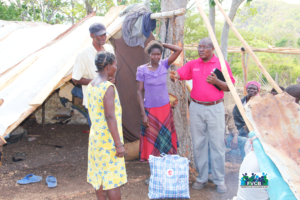 returned or deported Haitians from the Dominican Republic following a change in the legislation. Those people urgently needed to be reintegrated into the Haitian society.
returned or deported Haitians from the Dominican Republic following a change in the legislation. Those people urgently needed to be reintegrated into the Haitian society.
Our medical teams and our Kore Fanmi agents worked in 2 refugee camps in Anse-à-Pitres to provide medical care, food, and hygiene items to hundreds of refugees who had nowhere to go.
Fixed and mobile clinics development
Since 2010, HHI-FVCB developed a network of fixed and mobile clinics. We are currently providing primary health care 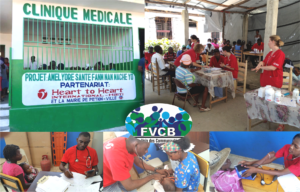 to the Haitian population through 10 clinics located in Port-au-Prince, Léogâne and Belle Anse. We employ Haitian doctors, nurses, pharmacists, and laboratory technicians to manage those clinics.
to the Haitian population through 10 clinics located in Port-au-Prince, Léogâne and Belle Anse. We employ Haitian doctors, nurses, pharmacists, and laboratory technicians to manage those clinics.
Volunteer medical professionals from all over the world join our team for 15 days to several months to share their skills, help our clinics to reach international health standards and answer the needs of the population.
However, HHI-FVCB makes a point of honor breaking the cycle of dependency. Thus, a contribution is requested from each patient according to his/her means. Even with our best efforts, this program still needs funding to keep the clinics working, to ensure continuous improvement of the patient follow-up but also to develop new specific sections. For more information, please check p.20 “On The Horizon: Expand our programs (Develop New Sections)”.
Women health in Petion Ville
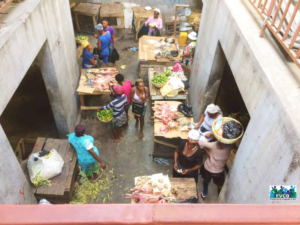 HHI-FVCB developed a complete health program for the women working as vendors in the open-air market of Petion Ville (La Coupe, Route de Freres). Though the need for a clinic in the marketplace seemed apparent, HHI-FVCB recognized the necessity of validating that assumption. A need assessment survey was conducted and provided us with information about the women’s lifestyles, including family, tobacco and alcohol use, and health history.
HHI-FVCB developed a complete health program for the women working as vendors in the open-air market of Petion Ville (La Coupe, Route de Freres). Though the need for a clinic in the marketplace seemed apparent, HHI-FVCB recognized the necessity of validating that assumption. A need assessment survey was conducted and provided us with information about the women’s lifestyles, including family, tobacco and alcohol use, and health history.
In addition to the data collected, our agents interviewed the women, discussing their personal and family responsibilities, financial issues and the amount of stress in their lives. Based on factors including the information regarding personal histories, FVCB’s observations of conditions in the marketplace (extremely crowded and unsanitary conditions, lack of basic hygiene such as handwashing stations or latrines, etc.), and the organization’s long history and knowledge of Haiti and the Haitian healthcare system, it was decided that there was a clear unmet need to improve access to healthcare for the women in the marketplace.
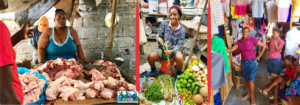
Women health in petion ville marketplace
A new toilet block was built in the market and a building was turned into a clinic. Strategically located within the open-air market, the clinic has been offering proximal and affordable medical care to vendors and their families since February 2018. Patients of this market clinic receive comprehensive care (including point-of-care laboratory testing) for chronic diseases, general medical needs and wound care. No patient is turned away, and pharmaceuticals are free. Costs are minimal to ensure accessibility, and the clinic is no more than ten minutes walking distance from the farthest patient’s stall.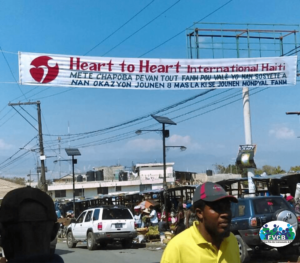
Thanks to partnership with the local government and the in-kind donations of buildings and space for this program as well as GIK medications and support from private funders – especially Becton Dickinson (BD) and the Medtronic Foundation – we have managed to successfully deliver this health program for more than one year. Currently, the clinic has more than 5,000 registered patients, conducts 50 consultations per day on average, and has reached a very high rate of compliance with follow-up appointments (more than 98%).
FVCB is still looking for new funding to develop the program.
Women health in the markets of petion ville and port-au-prince Focus
FVCB wants to do more for the women of Pétion Ville marketplace by not only continuing to provide improved access to healthcare but also by building their capacity to achieve improved economic situations. Thus, we aim to implement the MUSO strategy – a strategy that we have already implemented in Petit Goâve and in the South East department – to facilitate access to micro-credit for the market vendors to build their own self-sufficiency for the future while ensuring long-term financial security of the market clinic.
Replicating the MUSO Model for the vendors of the open-air market of Pétion Ville will provide sustainable financial security for the women which will better equip them to pay marginally increased clinic fees and subsequently contribute to the longevity of the FVCB-Haiti market clinic.
We are confident in MUSO strategy, and we believe that the women – who are already vendors and have basic knowledge about business, loan, and repayment – will know how to take advantage of it. FVCB seeks to build upon their existing experiences and provide them with business education to aid the management of their existing enterprises, reduce their daily economic burden and improve their quality of life. The MUSO strategy will help them acquire savings and better opportunities to invest in their businesses, healthcare and education for their children. We are convinced we will see the financial sustainability of these groups directly reflected in the financial sustainability of our clinic.
Furthermore, several other markets in Petion Ville and Port-Au-Prince with a similar layout could benefit from such a program. Having already been approached from other local governments in the Port-au-Prince metro area, FVCB is aware there is significant demand for this type of market intervention. The complete survey we conducted among the women in the open-air market in Petion Ville as well as the support of several funders in this market guarantee the quality and relevance of the program. We would be glad to capitalize on our know-how and to find new funding to develop the program in new locations.
The potential of MUSO strategy is huge and knowing how successful it was in Petit Goâve and the South East department, we think it would be relevant to start similar projects in other locations where HHI-FVCB is already operating. 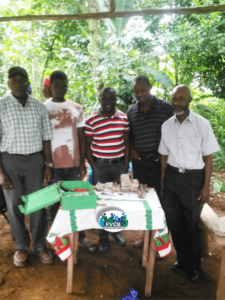
Expanding this program could both strengthen the financial capabilities of the communities and facilitate the development and sustainability of our other programs.For instance, it could greatly help in the implementation of WASH programs (ACAT methodology) or in the sustainability of our fixed and mobile clinics.
In addition, HHI-FVCB identified limited literature on microfinance evaluation/measurement tools that focus on social performance – and even less in the Haitian context. We think this dearth of knowledge can be detrimental to the efficiency of our program.
That is why we are planning to launch a research project specifically dedicated to the MUSO model which will aim to:
- Improve our evaluation system to strengthen the global quality of our program
- Develop a methodology that could be used by other organizations around the world
- Identify best practices that are appropriate for Haitian culture and develop a theory of change that is rooted in participant lived experiences
- Contribute to the creation of a knowledge base to develop microfinance and its social performance in Haiti
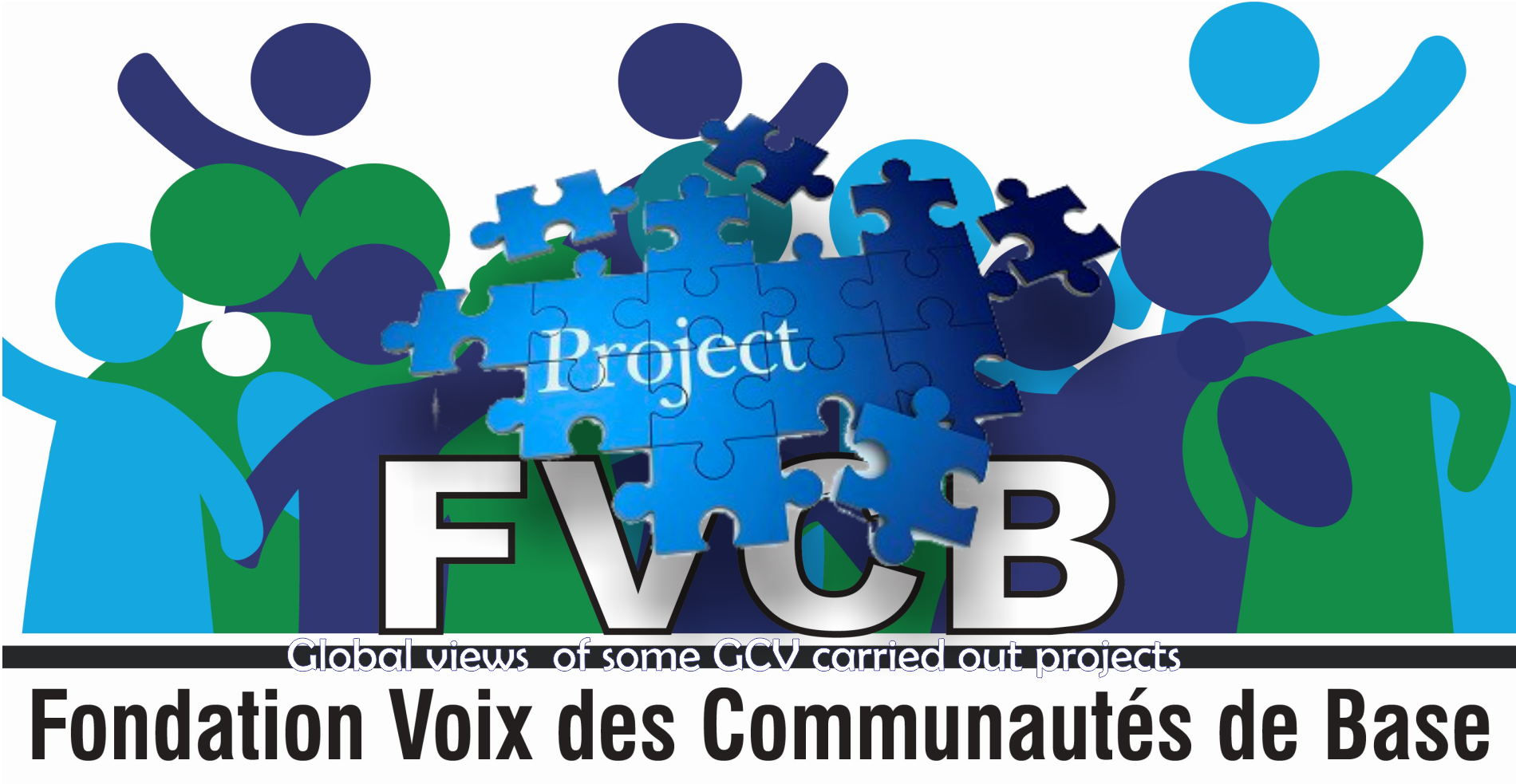
Current projects
PARR?
orsque vous consultez un site Web, des données peuvent être stockées dans votre navigateur ou récupérées à partir de celui-ci, généralement sous la forme de cookies. Ces informations peuvent porter sur vous, sur vos préférences ou sur votre appareil et sont principalement utilisées pour s'assurer que le site Web fonctionne correctement.
WASH?
orsque vous consultez un site Web, des données peuvent être stockées dans votre navigateur ou récupérées à partir de celui-ci, généralement sous la forme de cookies. Ces informations peuvent porter sur vous, sur vos préférences ou sur votre appareil et sont principalement utilisées pour s'assurer que le site Web fonctionne correctement. Les informations ne permettent généralement pas de vous identifier directement, mais peuvent vous permettre de bénéficier d'une expérience Web personnalisée.
